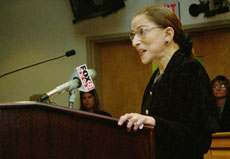Judges Judah Benjamin, Alvin Rubin, Skelly Wright and John Minor Wisdom were “four giants in Louisiana law,” according to U.S. Supreme Court Justice Ruth Bader Ginsburg. Ginsburg spoke at the Law School Monday.In her speech, the fourteenth annual lecture in the Ainsworth Lecture Series, she underlined the importance of the Supreme Court, federal laws, activism and freedom.The Supreme Court’s second female justice, Ginsburg was appointed Associate Justice to the Supreme Court by former President Clinton in 1993. She is the Supreme Court’s second female justice. Her speech outlined the civil rights movement through the careers and lives of the four judges, using anecdotes of her personal experience with them along with quotations and facts.Ginsburg spoke of Benjamin, the 19th-century New Orleans lawyer who almost became the Supreme Court’s first Jewish justice but turned down his nomination.”He captured my imagination,” she said.Ginsburg described Reuben, a Fifth Circuit Court of Appeals judge, as “always true to legal source.”Ginsburg spoke of Wisdom, who was involved in the desegregation of the 1950s. Bonnie Wisdom, widow of Judge Wisdom, was in the audience.Ginsburg also described how Wright made a binding legal ruling with a quotation of Dr. Seuss’s “Horton Hears a Who.” “A person is a person, no matter how big or small,” she quoted Wright as having said. She also said that Wright called himself “an activist, a liberal.” The lecture series was founded and financed by friends of the late Judge Robert Ainsworth Jr., former U.S. District Court Judge of Eastern Louisiana and Judge of the U.S. Court of Appeals for the Fifth Circuit. Organizers annually invite a distinguished member of the legal community to speak at Loyola’s Law School. The series has brought such notables to Loyola as former White House special prosecutor Kenneth Starr, former Supreme Court Chief Justice Warren Burger and Associate Justice Antonin Scalia.”Diversity is essential,” former Louisiana Supreme Court Justice Harry Lemmon said in his introduction speech. Lemmon, a member of Loyola’s Visiting Committee, organized this year’s event. Lemmon said that Ginsburg used her early career as a couselor to battle discrimination.Ginsburg graduated from Cornell University in 1954, where she received a bachelor of arts in Government. She then attended Harvard Law School, made Harvard Law Review and graduated from Columbia Law School in 1959, as a member of Columbia Law Review and as a Kent Scholar. Ginsburg holds honorary degrees from more than twenty colleges and universities. She has taught law, led the ACLU Women’s Rights Project, written two books, contributed articles to publications and served on boards for the American Bar Association.In front of the main campus, a line of anti-abortion/anti-Ginsburg protesters waved signs and shouted in objection to Ginsburg’s appearance at Loyola. The protesters said they disapproved of such a pro-choice advocate speaking at a Catholic university.Wilson said Ginsburg is in great demand as a speaker. “Justice Lemmon booked her as the Ainsworth lecturer over a year ahead of time,” she said.
-with reporting by Curie Veronica Jones
Click here to start a discussion on this story.






